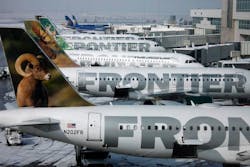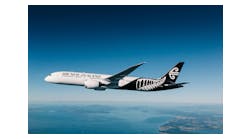Aug. 09--Frontier Airlines may soon be sold to a private equity firm in Phoenix that wants to turn Denver's hometown airline into an ultra low-fare carrier, comparable to Spirit Airlines and Allegiant Air.
Two area airports where Frontier flies -- Trenton Mercer and New Castle near Wilmington -- say they are confident that Frontier will continue to serve their markets with the level of flights they have now.
Frontier has 35 departures a week to 10 destinations from Trenton, and operates 14 flights per week to five cities from Wilmington.
"Frontier flights are going out 90 percent to 95 percent full," said Brian Hughes, county executive of Mercer County, which owns Trenton airport. "The airline is successful enough that any owner or investor would want to continue their relationship with Trenton Mercer."
Republic Airways Holdings, which owns Frontier, told investors on an earnings call July 26 that it has signed a non-binding agreement with an unnamed buyer. While several "conditions" must be resolved, the deal is expected to close by late September, Republic chief executive officer Bryan Bedford said.
Republic postponed its annual shareholder meeting until Sept. 17.
Indigo Partners L.L.C., a Phoenix firm that invests in low-cost airlines around the world, including Spirit, Singapore-based Tiger Airways, and Hungary's Wizz Air, is reportedly the potential buyer.
Indigo managing partner William "Bill" Franke has said he sees a U.S. market for a third ultra low-fare carrier, in addition to Miramar, Fla.-based Spirit and Allegiant, whose parent, Allegiant Travel Co., has headquarters in Las Vegas.
An Indigo spokeswoman said the company could not comment. "The timing is not appropriate," she said.
Frontier's strategy is much like Spirit and Allegiant. They use a mix of smaller secondary airports, where landing fees cost less but are close to large metropolitan areas, and some major airports.
Spirit, for example, flies out of both Atlantic City and Philadelphia International Airports.
Ultra low-cost carriers fly reduced schedules compared to major airlines. By operating routes two or three times a week, instead of daily, fewer crews are required, planes are full, and aircraft maintenance is spread over longer periods of time. Their focus is on leisure travelers.
"My expectation is that any potential new owner would continue the secondary airports strategy," said Stephen Williams, director of Wilmington New Castle and four other small airports operated by the Delaware River & Bay Authority.
Since Frontier began flying from Wilmington on July 1, the 168-seat Airbus 320 planes have been 90 percent full to Chicago-Midway, Denver, Houston, Orlando and Tampa, Fla., Williams said. "It is going very, very well."
While Spirit and Allegiant offer low base fares, they charge for everything on the flight -- from soft drinks to carry-on bags in the overhead bin.
Frontier, whose planes' tails have pictures of wild animals, began charging this week for carry-on bags, if tickets are purchased on third-party travel websites, such as Orbitz and Expedia. Carry-on luggage is still free for trips booked on Frontier's website, flyfrontier.com.
Indigo sold its interest in Spirit last week, divesting itself of 12 million shares of Spirit stock.
Franke and another Indigo partner, John Wilson, also resigned from Spirit's board of directors. The reason is, presumably, that Indigo will soon own a low-cost competitor, Frontier, and will battle for U.S. travelers.
Republic Airways has been trying to sell Frontier for more than a year. Republic owns Chautauqua Airlines and flies under major airline brands, including US Airways Express, American, United and Delta Connection.
Copyright 2013 - The Philadelphia Inquirer





